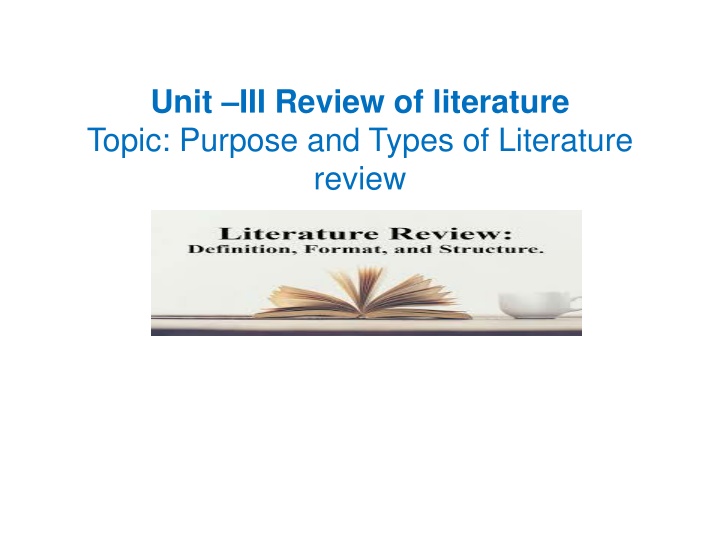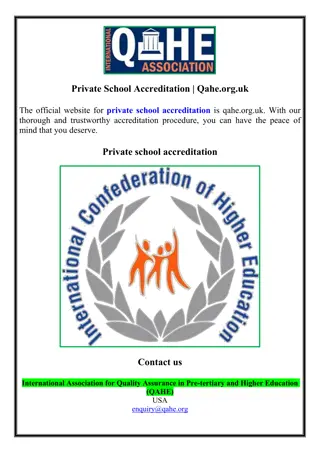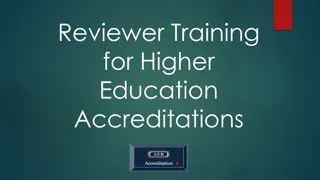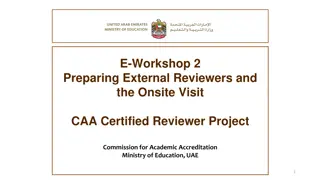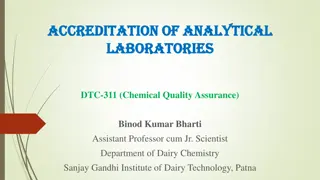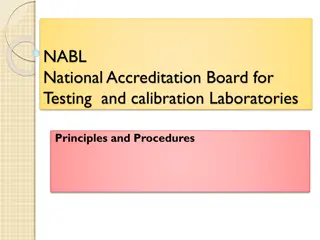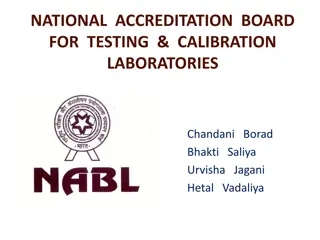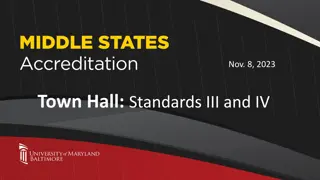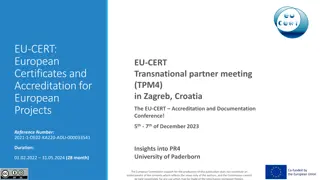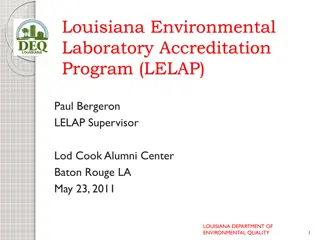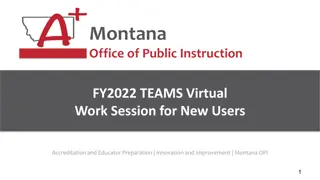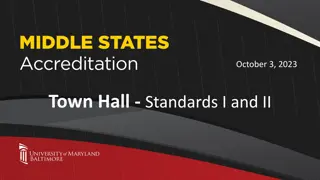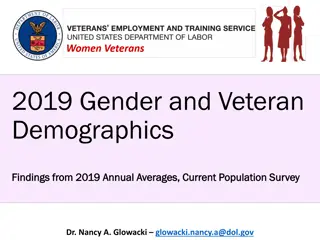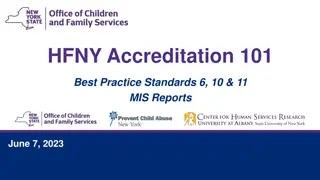Veteran-Friendly Practice Accreditation: A Beginner's Guide
Congratulations on achieving veteran-friendly practice accreditation! This guide will help improve medical care for veterans, enable access to NHS services, and reduce practice workload. As a clinical lead, your role is crucial in educating and informing your team, safeguarding accreditation, and being a point of contact for veteran matters. Expectations include knowing veterans, applying SNOMED code, staying updated on referral pathways, and understanding veteran needs. Being a veteran-friendly practice aligns with the Armed Forces Covenant and NHS Constitution, emphasizing patient-centered care. Learn why this commitment is important and how it reflects on the NHS Long Term Plan.
Download Presentation

Please find below an Image/Link to download the presentation.
The content on the website is provided AS IS for your information and personal use only. It may not be sold, licensed, or shared on other websites without obtaining consent from the author.If you encounter any issues during the download, it is possible that the publisher has removed the file from their server.
You are allowed to download the files provided on this website for personal or commercial use, subject to the condition that they are used lawfully. All files are the property of their respective owners.
The content on the website is provided AS IS for your information and personal use only. It may not be sold, licensed, or shared on other websites without obtaining consent from the author.
E N D
Presentation Transcript
Unit III Review of literature Topic: Purpose and Types of Literature review
Objectives At the end of the class the student will be able to define Review of literature. list down the purposes of literature review enlist the types of literature.
INTRODUCTION The literature review is an integral part of the research process and an account of what is already known about a particular phenomenon. The main purpose of literature review is to convey to the readers about the work already done and the knowledge and ideas that have been already established on a particular topic of research.
Meaning of Review of literature A review of a literature is a description and analysis of the literature relevant to a particular topic or field . It provides an overview of what work already had been carried out , who are the key researchers , which of the questions are addressed earlier regarding the researchers area of interest , methodologies used to answer the question and what are prevailing theories and hypothesis. what methods and
What is review of literature? A research literature review is a written summary of the state of evidence on a research problem. Polit & Beck Review of literature is a broad, comprehensive in depth, systematic and critical review of scholarly publications, scholarly print materials, personal communications. including unpublished audiovisuals and Basavanthappa.
Purposes of Review of literature Discovers knowledge Conveys to the reader what is currently known regarding the topic of interest Determines gaps , inconsistencies Discovers unanswered questions Describes the strengths & weaknesses of designs, instruments used in studies consistencies and
Purposes of Review of literature Cont Determines the need to replicate a study For development of new/refined interventions Identifies relevant framework methods Identifies the source of funding & the experts in the field Assists in interpreting study findings designs &
Literature review in Qualitative studies The Purpose & timing depend on the type of study, Phenomenological research Experiences of individual within their life world. after the data collection & analysis Grounded theory research social structural process within a social setting. minimal relevant review in the beginning of the study
Literature review in Qualitative studies cont Ethinographical research Holistic view of culture. done early in research process to give background for the study Historical research interpretation of historical events. an initial review to select the research problem & to develop research questions description and
Literature review in Quantitative studies Major review is done at the beginning of the research process & limited review during the generalization of research report
Types of literature On the basis of purposes and methodologies, literature review would be broadly classified into following categories: Theoretical literature Empirical literature Traditional or narrative literature review Systemic literature review: Meta-analysis Meta-synthesis
Theoretical literature It consists of concept analysis, models, theories & conceptual frameworks that support a selected research problem and purpose. Based on theory rather than experience. It reflects the current understanding of the research problem . Theoretical literature can be found in the serials, periodicals & monographs
Empirical literature Comprises of relevant studies in journals & books as well as unpublished theses Empirical literature reviewed depends on the study problem & the type of research conducted Based on observations and experiments
Traditional or narrative literature review It presents the summary of literature and draws conclusions about the topic in question. The body of literature is composed by a summary of facts on the subject area from the primary and secondary sources. The traditional literature is essential for getting in-depth insight in subject area, refining the research question and hypotheses and support the importance of identifying the gaps and inconsistencies in existing literature. new research through
The systemic literature review It is significantly different from the traditional or narrative literature review, which includes more systemic and rigorous approach of literature review in a specific subject area. contrary to narrative systemic review uses explicit and rigorous criteria to identify, critically synthesize all the published and unpublished literature available on a particular topic of interest. literature review, the evaluate, and
Meta-analysis Meta-analysis is an advanced form of systemic literature review, which includes a large body of findings from quantitative studies and computes the statistical analysis for drawing the integrated and cumulative inferences and conclusion. Ex:Snethan,Broome ,and Cashin(2006) conducted a metaanalysis research on effectiveness of weight loss intervention for children.The researcher integrated results interventional studies toanalyse from sevent
Meta-synthesis The technique used to integrate, evaluate, and interpret the finding uses of multiple qualitative research studies phenomenological, grounded ethinographic studies). meta-synthesis is the non-statistical (findings from or theory Ex:Goodman metasynthesis of seven qualitative studies that focussed on fatherhood in the early months after the birth of an infant. (2005) conducted a the experiences of
Summary Literature review will support the research study It provide you with a handy guide to a particular topic. For professionals, they are useful reports that keep them up to date with what is current in the field. For scholars, the depth and breadth of the literature review emphasizes the credibility of the writer in his or her field.
References Burns, N., & Grove, K. S. (2005). The practice of nursing research: Conduct, utilization (5th ed.). Publication. Munshall, P. L. (2001). Nursing Research: A qualitative perspective. Sudbury, MA: Jones & Bartlett Polit, F. D., & Beck, T. C. (2011). Nursing research generating and assessing evidence fir nursing practice (8th ed.). New Delhi: Wolters Kluwer (India) Pvt. Ltd. Taylor, T. (2011). The literature review: A few tips on conducting it. Retrieved June 6, 2011 from http://wwwwriting utoronto ca/advice/specific types-of-listing/literature-review. critique and Missouri: Elsevier
